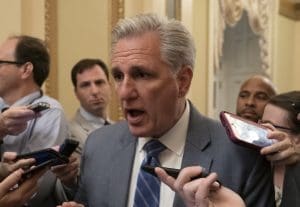5 lies Republicans are telling to try to sink a landmark voting rights bill
The GOP opposition to the pro-democracy H.R. 1 bill is built on misinformation.

House Republicans are uniting in opposition to H.R. 1 — a landmark pro-democracy bill from Democrats seeking to expand voting rights — falsely accusing it of being an “unraveling of our democracy” designed to keep Democrats in power.
If signed into law, Democrats hope the bill, known as the For the People Act, will strengthen democracy by breaking down barriers to the ballot box, making it easier for all eligible citizens to vote and make their voices heard. It also includes reforms designed to bolster ethics in campaigns and limit the influence of dark money.
Among its provisions, the bill requires states to establish automatic voter registration for federal elections, limits voter roll purges Republicans have used to try to disenfranchise Black voters, requires states to have early voting, allows anyone who wants to vote absentee to do so, and gives those who complete felony sentences the right to vote again.
Yet Republicans — who have told baseless lies about voter fraud for years — say the bill making it easier to vote is meant to keep Democrats in power.
For example, Rep. Ted Budd (R-NC) falsely said the bill “rigs election rules to favor Democrats.”
To some observers, it appears to be an open admission that Republicans believe they cannot win elections if every eligible American can vote — something Donald Trump himself admitted ahead of the 2020 election.
“They had things, levels of voting that if you ever agreed to it you’d never have a Republican elected in this country again,” Trump said in March 2020, when Democrats sought to increase funding for states to carry out elections safely during the COVID-19 pandemic.
Here are some of the lies Republicans are telling to justify their opposition to expanding voter rights.
It will allow ‘illegal aliens’ to vote
This claim came from Rep. Andy Biggs (R-AZ) during Monday’s debate on the bill.
Undocumented immigrants, along with non-citizens, are not eligible to vote and would not be given that right by H.R. 1.
Federal law states that it is, “unlawful for any alien to vote in any election held solely or in part for the purpose of electing a candidate for the office of President, Vice President, Presidential elector, Member of the Senate, Member of the House of Representatives, Delegate from the District of Columbia, or Resident Commissioner.”
It’s unclear why Biggs would say H.R. 1 would allow undocumented immigrants to vote, but Republicans made the same baseless allegations in 2019, when H.R. 1 first passed the House but was blocked by “Grim Reaper” Senate Majority Leader Mitch McConnell from ever getting a vote in the Senate.
Republicans like Biggs have also said Democrats want to “legalize cheating” in elections because H.R. 1 provides some workarounds for voters to combat what it calls “excessively onerous voter identification laws.”
According to reports from voting rights advocates like the American Civil Liberties Union, reducing excessive voter ID requirements protects the poor, the elderly, and people of color, who are disproportionally disenfranchised by the laws.
In fact, the ACLU said in a report that a whopping 11% of Americans eligible to vote do not possess the kind of ID required by voter ID laws that have passed in states like Texas and North Carolina.
H.R. 1 is ‘not designed to protect your vote’
This is a false claim by House Minority Leader Kevin McCarthy, who said on Tuesday, “Democrats’ election bill is not designed to protect your vote. It’s designed to put a thumb on the scale in every election in America so that Democrats can turn a temporary majority into permanent control.”
However, the writers of H.R. 1 intended to protect votes by quashing the GOP’s attempts at voter suppression.
“The first 300 pages of this bill were written by John Lewis to eliminate voter suppression, which has become rampant in our country,” House Speaker Nancy Pelosi said Tuesday in a speech promoting passage of the bill. “How do we say to our Founders, we salute you for what you have done, and we are going to do everything in our power to make sure we suppress the vote? It’s so inconsistent.”
H.R. 1 would block the effort from Republican state lawmakers to limit who can vote by mail, requiring that states allow anyone who wants to vote by mail should to do so.
The bill also prevents your registration from being wrongfully purged from voter rolls and would require that eligible citizens be automatically registered to vote.
The bill ‘destroys the First Amendment’
This false and hyperbolic claim was made by Rep. Rodney Davis (R-IL), who listed this lie among “The top 10 most egregious provisions of H.R. 1.”
Davis wrote that H.R. 1 would “disadvantage all groups who wish to advocate on behalf of any legislative issue, specifically requiring them to disclose the names of donors who donate above a certain threshold.”
The provision Davis is up in arms about is one that seeks to limit the impact of money in politics by requiring “all organizations involved in political activity to disclose their large donors,” according to a summary of the bill from Rep. John Sarbanes (D-MD), the chief sponsor of the legislation.
This provision seeks to diminish the power of so-called “dark money” in politics — a method by which wealthy donors can bankroll super PACs without anyone knowing.
H.R. 1 does not prohibit those donors from giving money. It merely says those wealthy people cannot shield their contributions from public view.
The bill ‘increases vulnerability for foreign election interference’
This is another false claim from Davis.
Davis claims that H.R. 1 “weakens the voting system of the American people by centralizing the election system, thereby increasing its vulnerability to foreign interference.”
However, under H.R. 1, states still administer elections. And H.R. 1 specifically seeks to enhance election security by providing federal support to states for paper ballots and adding more “oversight of election system vendors,” according to Sarbanes’ summary.
For example, the bill requires that at least 180 days before an election, the director of national intelligence must “submit an assessment of the full scope of threats, including cybersecurity threats posed by state actors and terrorist groups, to election infrastructure and recommendations to address or mitigate such threats.”
It also seeks to root out foreign interference by requiring campaigns to report any contact from foreigners seeking to influence an election — a provision that appears to be borne out of Donald Trump’s 2016 campaign’s contacts with figures tied to Russia.
Taxpayer dollars will fund campaigns
Republicans are also voicing their opposition to a pilot program within H.R. 1 that will match small-dollar contributions to federal candidates with federal dollars.
Republicans are falsely saying that taxpayers will be funding the small-dollar public financing program. However, according to the summary from Sarbanes, the program will actually be paid for by a “surcharge on corporate law breakers and wealthy tax cheats.”
Public financing of campaigns is nothing new, and was even used by conservative icon Ronald Reagan. The Brennan Center for Justice, which supports the legislation, writes, “Thanks to the presidential public financing system, Ronald Reagan was reelected by a landslide in 1984 without holding a single fundraiser.”
The Brennan Center added that public financing helps create a more diverse pool of candidates by allowing those who are not rich and do not have wealthy friends and associates to bankroll their political campaigns to run.
The Brennan Center also said that studies have shown that small-donor matching programs have led candidates to “raise significantly more money from donors in their own districts than other candidates running in the same areas.”
Published with permission of The American Independent Foundation.
Recommended

Direct mailers distort California Democrat Will Rollins’ record
Rollins, a former federal prosecutor, is challenging incumbent GOP Rep. Ken Calvert.
By Jesse Valentine - April 25, 2024
Assisted living home lawsuit, citations add to controversy over Hovde’s nursing home remarks
Campaign says GOP Senate hopeful has no responsibility for facility and lawsuit lacks merit
By Erik Gunn, Wisconsin Examiner - April 24, 2024
Biden on abortion rights: President expects to give speech Tuesday on new Florida 6-week ban
‘Having the president of the United States speaking out loud and with confidence about abortion access is a great thing’
By Mitch Perry, Florida Phoenix - April 22, 2024






































































